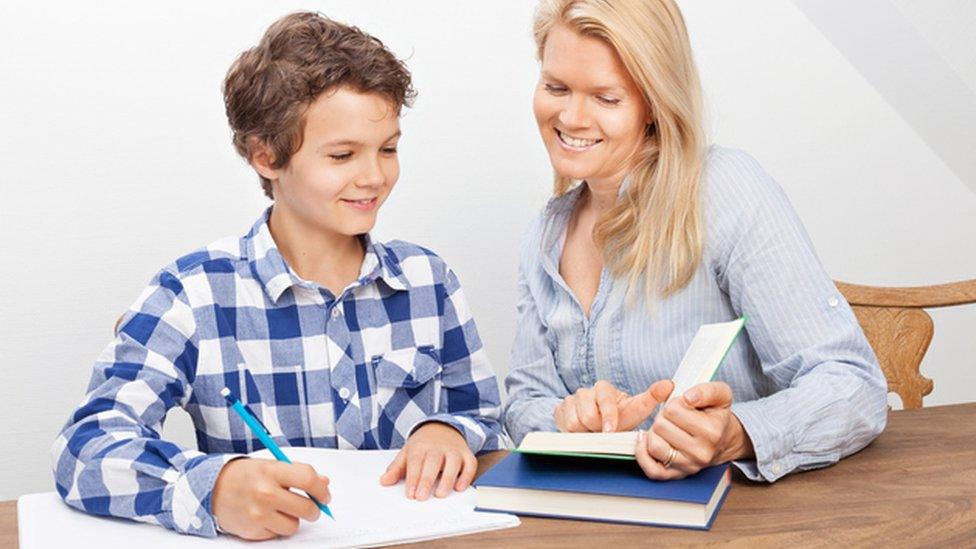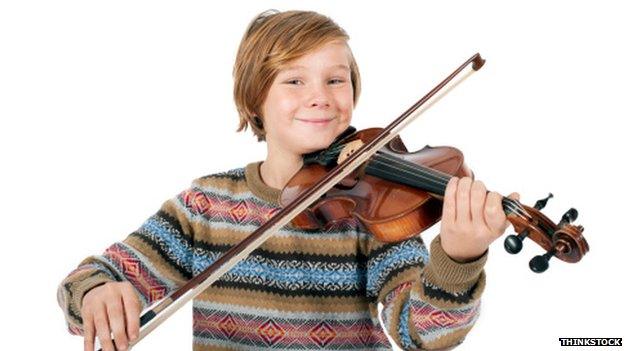Private tutors 'must face criminal records checks'
- Published

The vast majority of tutors do not pose a risk to children
All self-employed tutors should be legally required to have a criminal records check before they can offer private lessons to children in the UK, children's charity the NSPCC says.
A current loophole means self-employed tutors do not have to undergo Disclosure and Barring Service checks.
The NSPCC says this loophole creates an "ideal scenario" for "any predatory adult seeking to harm children".
The Home Office said it would "carefully consider" the comments.
Teachers working in schools must have a DBS check, external, which looks for criminal records and ensures they have not been banned from working with children or suspended from the profession.
Many tutoring agencies will insist on an up-to-date check on their staff, but some do not - and individuals setting up privately are not legally required to have a DBS certificate.
Employers and licensed bodies can request DBS checks, but individuals cannot, meaning parents and tutors cannot run such checks.
Now, the NSPCC is calling for a tightening of the law to ensure every individual giving private tuition undergoes a check, saying the same rules should apply for self-employed tutors as for classroom teachers.

Analysis by Home Affairs correspondent Danny Shaw
The vast majority of people who tutor children have the best of intentions and present no risk.
But there are a small number who will exploit the lax controls that so evidently exist, particularly for those who are self-employed.
Even using an agency to source a tutor is no guarantee of honesty or safety.
One website I came across says the tutors it supplies are not required to undergo a criminal records check, while the questionable standard of some of those offering their services on the site, who charge as little as £15 per hour, simply reinforces the call for tighter regulation.
Of course, using a fully-vetted tutor does not mean that your child is safe - some paedophiles manage to stay off the police radar for years - so it's best to follow the advice set out by the NSPCC.

The NSPCC recommends:
parents employ tutors through reputable agencies
parents should also take additional steps to check a tutor is suitable, such as interviewing prospective tutors, following up references and speaking to previous employers
making sure that their children understand how to keep themselves safe from abuse, for example by teaching them the Underwear Rule, external.
Peter Wanless, chief executive of the NSPCC, said many parents would consider employing a tutor over the summer.
"Clearly the vast majority of private tutors are not child abusers, but the current legal loophole makes it an ideal scenario for any predatory adult seeking to harm children," he said.
"Children have a right to be educated in safety, and parents need to know that every care has been taken to ensure unsuitable people cannot practise as tutors.
"The rules on applying for criminal record checks need to apply to self-employed tutors just as they do for teachers employed in schools."
'Vital role'
Research conducted by education charity the Sutton Trust last year estimates about 25% of school pupils in England and Wales have received some form of private tuition.
A Home Office spokesman said: "The Disclosure and Barring Service checks play a vital role in helping to keep the public safe.
"Private tutors - like others working or volunteering with children and vulnerable adults - are able to apply for a check through a 'registered body' whose staff are qualified to verify a candidate's eligibility and identity.
"This service is offered by a range of agencies used by tutors to find employment... Tutors can also supply the check to parents or guardians of their prospective pupils."
- Published4 September 2014

- Published6 September 2013